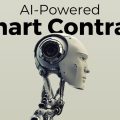Artificial Intelligence (AI) and Blockchain are two transformative technologies that have captured the imagination of the tech world in recent years. While they serve distinct purposes, their integration holds immense promise. An example of this potential is the utilization of these technologies for seamless online trading, offering users a unique experience in managing digital assets. This integration exemplifies how AI’s predictive analytics and Blockchain’s secure ledger system, such as the application found at https://immediate-core.com/, can work together to enhance online transactions. In this article, we delve deep into the exciting realm where AI meets Blockchain, exploring the synergies, challenges, and future prospects of this convergence.
Understanding AI and Blockchain
AI: A Catalyst for Intelligent Automation
Artificial Intelligence, or AI, is a field of computer science that aims to create systems capable of performing tasks that typically require human intelligence. These tasks include language understanding, problem-solving, pattern recognition, and decision-making. AI systems can be classified into Narrow AI, which is designed for specific tasks, and General AI, which possesses human-like intelligence.
AI has already made significant inroads into various industries. In healthcare, it aids in diagnosing diseases and developing personalized treatment plans. In finance, it powers fraud detection and algorithmic trading. In transportation, it enables self-driving cars. The potential applications are boundless.
Blockchain: A Trustworthy Ledger
Blockchain is a distributed ledger technology known for its transparency, security, and immutability. It was initially developed to underpin cryptocurrencies like Bitcoin but has since found applications beyond digital currencies.
Blockchain operates as a chain of blocks, each containing a record of transactions. These blocks are linked in chronological order, forming a chain. Once data is added to a block, it cannot be altered, ensuring data integrity. Blockchain transactions are verified by a network of nodes, eliminating the need for a central authority.
The Synergy between AI and Blockchain
Benefits of Integration
The integration of AI and Blockchain combines the strengths of both technologies, leading to several advantages:
- Enhanced Security and Trust: Blockchain’s tamper-resistant nature ensures data integrity and security. When AI algorithms run on a blockchain, users can trust the results and the data used for training.
- Improved Data Quality and Integrity: Blockchain’s transparent and immutable ledger ensures that data used by AI models is accurate and hasn’t been manipulated. This is critical for applications like AI in supply chain management.
- Smart Contracts and Automation: Smart contracts, self-executing contracts with the terms directly written into code, automate processes on the blockchain. AI can enhance these contracts by adding intelligence, enabling complex decision-making within contracts.
Real-World Use Cases
The potential of AI-Blockchain integration is already being realized in various sectors:
- Supply Chain Management: AI and Blockchain are being used to track and verify the movement of goods through the supply chain. This ensures transparency, reduces fraud, and helps trace the origins of products.
- Healthcare and Patient Records: Patient data can be securely stored and accessed through blockchain, with AI-driven analysis providing valuable insights for diagnosis and treatment.
- Finance and DeFi: Decentralized finance (DeFi) platforms utilize smart contracts to automate financial processes, while AI algorithms assess risks and make investment decisions.
- Identity Verification: Combining AI’s facial recognition capabilities with blockchain’s security, identity verification becomes more secure and less prone to identity theft.
Challenges and Concerns
Scalability Issues
One significant challenge is scalability. Both AI and blockchain are computationally intensive. When integrated, the demands on computing resources can be substantial, potentially leading to bottlenecks.
Privacy and Data Protection
The transparency of blockchain can be at odds with data privacy regulations. Striking a balance between transparency and privacy is essential.
Regulatory Hurdles
Regulatory frameworks for AI and blockchain are still evolving. This regulatory uncertainty can hinder innovation and adoption.
Energy Consumption Concerns
Blockchain’s energy-intensive consensus mechanisms, such as Proof of Work, have raised concerns about environmental sustainability. AI’s computational demands further exacerbate this issue.
Innovations in AI-Blockchain Integration
AI-Powered Consensus Algorithms
Innovations like AI-powered consensus algorithms aim to improve blockchain scalability and energy efficiency. By dynamically adjusting consensus parameters using AI, the network can optimize performance.
Privacy-Preserving AI on the Blockchain
Techniques like homomorphic encryption enable AI computations on encrypted data, preserving privacy while allowing valuable insights to be extracted on the blockchain.
Federated Learning and Blockchain
Federated learning allows AI models to be trained on decentralized data sources without exposing the raw data. Combining this with blockchain ensures data integrity and security.
AI-Driven Smart Contracts
AI can enhance the capabilities of smart contracts, making them more adaptive and intelligent. For example, an AI-driven smart contract could automatically adjust insurance premiums based on real-time risk assessment.
Future Trends and Possibilities
Prediction for AI-Blockchain Integration
In the next 5-10 years, we can expect deeper integration of AI and blockchain across industries. This convergence will drive innovation, improve efficiency, and redefine how businesses operate.
Emerging Technologies and Research Areas
- Quantum Computing and Blockchain: Quantum computing has the potential to break existing encryption methods, but it could also offer new solutions for secure blockchain networks.
- Interoperability Between Blockchains: Solutions for interoperability between different blockchain networks will become crucial as the blockchain ecosystem continues to expand.
- Decentralized AI Marketplaces: These platforms will facilitate the buying and selling of AI models and services on the blockchain, creating a global marketplace for AI.
Conclusion
The integration of AI and Blockchain is poised to revolutionize industries, offering enhanced security, data integrity, and automation. However, challenges such as scalability, privacy, and regulation must be addressed. As innovations continue to emerge, the future holds exciting possibilities for this convergence. Collaboration and innovation in this space will be key to unlocking its full potential.






